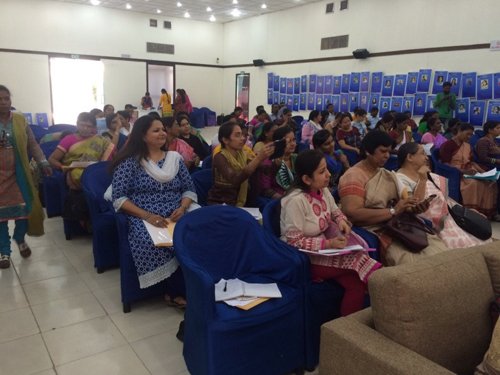National Alliance of Muslim Women
SAHR WARU has formed an informal network of Muslim women at the National level, a network of enlightened women from varied academic and professional backgrounds who are ready to change the perceptions of the other community and to work for the advancement of the Muslim community in India. The women have high potential and the drive to bring about a change and work for the advance of Muslim Women.
In the year 2007 we held Muslim women’s consultations on “Socio-economic and political concerns of the Muslim women and Community in the present context”, these consultations were held in South, East and Central regions and culminated into an Informal network through the National Reflection Retreat held on “Women and Islam”.
The network involves enlightened Muslim women from all over the country and includes women in a cross section of society; they are poets, writers, government officers, doctors, lawyers, social activists, professors etc.
The consultation proved to be an eye opener to the status of the Muslim community in the country, the issues that were highlighted included discrimination, segregation, forced Ghettoization, lack of opportunities and citizenship rights in all of the states that were represented. These were Tamil Nadu, Karnataka, Kerala, Andhra Pradesh, West Bengal, Assam, Manipur, Meghalaya, Orissa, Bihar, Chattisgarh, Jharkhand and Madhya Pradesh.
Presently, we are aiming to take ahead the network through capacity building on Human Rights and National and International Mechanisms for protection of Human Rights to address to the present socio-political scenario.
This effort was possible through 3 Regional Consultations held in South, Central and Eastern Regions which culminated in a National Reflection Retreat that saw the formation of National Alliance of Muslim Women.
- Regional Consultations held with Muslim Women
SAHR WARU has held 3 Regional Consultations and a National Reflection Retreat with Muslim women, coming from varied backgrounds and professionals who were social activists, lawyers, doctors, government officers, writers, poets to share an understanding of issues of Muslim women in different states, and the state of the Muslim community and the issues that they are facing in the larger perspective.
Objectives of the Regional Consultations
- To understand the socio-political and culturo-religious concerns of the Muslim women in different states of India.
- To discuss and develop a dialogue amongst the “unheard voices” of the Muslim women in regions and India on the whole.
- To enable a dialogue amongst Muslim women with concern to the states and Regions on the status of the Muslim community and specially the Muslim women.
Highlights of the South Regional Consultation with Muslim Women:
- Issues related to Identity:
The Muslim Community is mostly linked to terror attacks and communal violence and has to prove his identity and nationality each time the attacks are made in any part of the country, while in the case of a Hindu or the Majority community, even though they come out openly saying that they had committed the crime or there are facts and evidences proving the perpetrator belonging to the Majority Community, there is no action against such a person. While any acts of crime in the name of religion is justified if committed by a Hindu.
- Issues related to Social Security:
There is increased ghettoization in most of the states, with social security being a major concern after Minority attacks backed by government and support by Hindu Right wing forces.
Highlights of the Central Regional Consultation with Muslim Women:
- The participants were from the states of Madhya Pradesh, Bihar, Rajasthan, and Chattisgarh, and coming from varied backgrounds – Social activists, Professors, Lawyers, Media persons, and Doctors.
- Dr. Syeda Hameed, member Planning Commission of India was the chief guest, she was accompanied by Dr. G. B. Panda, Advisor Planning Commission who shared that there have been initiates by the Planning Commission to mainstreams the concerns of the minorities in the 11th 5 Year Plan. Also sharing that the government is making efforts for the development of Minorities through the Ministry of Minority Affairs.
- The Participants shared the state’s condition in terms of Muslim Women’s Socio-Economic Condition.
The groups discussed different issues and concerns related to:
- Access to equal opportunities to the Muslim Community.
- Access to proper Education.
- Social Status of Muslim Women
- Issues related to identity and social security
- Issues related to Employment and Economic status of the Muslim Community.
Enlightened Muslim Women’s Needs on Perspectives of Socio-Economic, cultural and Gender Concerns: Eastern Regional Consultation:
- The eastern regional consultation was held in Kolkata with participants from West Bengal, Orissa, Jharkhand, and North Eastern states of Assam, Meghalaya and Manipur who, like their compatriots from the south and central regions belonged to different academic and professional backgrounds.
- Special invitees to the Consultation were Prof. Imtiaz Ahmed, renounced Sociologist from Delhi, and Dr. Hanif Lakdawala, Director Sanchetana. Prof. Imtiaz set the tone for the Consultation speaking about Islam and gender perspective of Islamic culture.
- Through the discussions and presentations of the participants about the situation of Muslim women within their community and state it was clear that the situation of Muslim women, is not uniform throughout the country but varies from one region to another. The situation of Muslim women is shaped by the social processes taking place in the Indian society and the regional cultural and social ethos.
Highlights of the Eastern Regional Consultation with Muslim Women:
- Need to fight poverty and lack of opportunities that the Muslim Community largely suffers in Bengal, Bihar, Jharkhand and other states of Eastern India.
- Need for massive systematic and sustained proactive educational support to girls and boys from state / non state secular institution to draw the largely poor sections of the Muslim community into the mainstream development and growth.
- Safeguard Human Rights, citizenship entitlements, with bias and discrimination.
- Need to build and sustain secular environment.
- Provide special institutional mechanisms for combating Violence against women and girls in the Muslim Community.
Highlights of the National Reflection Retreat:
- The participants to the National Reflection Retreat on Women and Islam was attended by participants from 12 states and were also part of the Regional Consultations held in the 3 regions.
- During the course of three days discussions were held on Islam as a Revolutionary Religion, Women in the Islamic Context, Leadership in the Islamic Countries, The 4 Original Caliphs of Islam “Attaining spirituality not Temporal Power”, Writings – Readings, Poetry and Sufi Thought, Networking and future Directions.
- The participants also stressed on issues such as Terrorism and how to deal with it.
- Discussions were held on linking Islam and Terrorism (misconceptions of the majority community).
- Discussions were held on women and globalization, and unemployment that are being created through globalization.
- Political Issues and how Muslims get used were also one of the concerns of the Participants.
- An informal Network was formed which was named “National Alliance of Muslim Women” and modalities of the functioning of a core group, the mission and principles were discussed.
A Dialogue between Hindu and Muslim Leaders
In the year 2008, we held a dialogue between Hindu and Muslim leaders who came and spoke their concerns and facts on Conflict and Peace. The dialogue was one in a kind where the leaders were social workers, scholars, professors, and lawyers coming from different parts of the country. It was interesting to note how they perceived conflict and how peace can be achieved.
CEDAW and Beijing Platform for Action
Being part of the Founder members and Executive committee of NAWO (National Alliance of Women) the Director is involved in National and International work on advocacy for women’s rights and human rights, through mechanisms like CEDAW and Beijing Platform for Action. She is one of the members who prepares the country reports on status of women for Beijing processes and CEDAW.
- The follow up visit to 3 Districts and 14 Rehabilitation Colonies for the CEDAW Review Report on Gujarat Violence 2002
- A visit was undertaken by our Teams to meet the women witnesses/survivors of the 2002 Violence in Gujarat in Anand, Panchmahal, and Modasa on 19th, 20th, 21st June 2014. We met with women, Victims, witnesses and survivors in 14 colonies and in places where they had to return; to assess the progress made in rehabilitation, compensation and justice for the victims/survivors within the purview of the CEDAW committees’ questions to Government of India and the reply sent by the Government.
- This visit of Relief colonies (IDP’s of the 2002 anti minority violence that took place in Gujarat.) was conducted in the last phase of the previous project for the purpose to collect details from the survivors about their current situation and entitlements provided by the government, on the basis of it SAHR WARU prepared CEDAW report for the alternate and presented in the international meeting at Geneva before the UN- CEDAW committee in 2014, which were brought up for queries before the Government of India. The Government of India has to again submit a report on the status of the rehabilitation for the 2002 survivors.
In, March 2015. The Director and team members of SAHR WARU participated in NAWO YOUNG WOMEN’S PARLIAMENT “Beijing & Beyond: Gender Equality and Development at New Delhi.

Justice Verma Commission- Petition
After the Delhi Gang Rape on 16th December 2012, a petition contatining 5052 signature was submitted to the Justice verma commision.
This action was taken place to reform with the laws and law enforcing bodies in the context of violence against women, gender based/caste/religion based violence against women/girls. For this the Director of SAHR WARU had written to the Justice Verma Commission urging them to particularly adress the marginaliased and underprevilaged people of the Indian society.
Presently, SAHR WARU is working in all levels – local, state, and national levels for Women’s Rights and Human Rights, and for advocating Peace and Pluralism.

